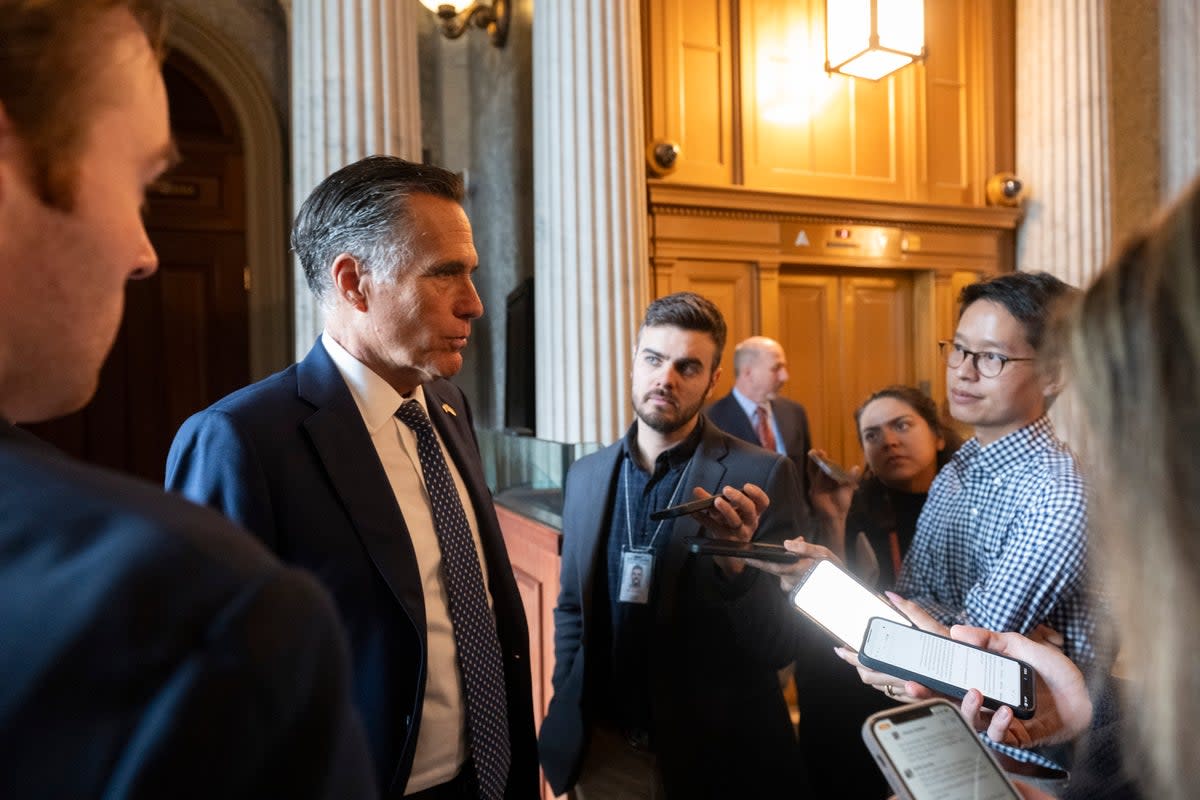The world takes Trump’s Nato comments literally, while Maga takes them seriously

Perhaps nothing symbolises the shift from the old-school Reaganite Republican Party to the Maga-fied manifestation that dominates politics today than the shift from Mitt Romney to Donald Trump’s foreign policy.
In 2012, Romney, then the Republican presidential nominee, famously called Russia “without question, our number one geopolitical foe.” Democrats dismissed him as daft in a world with al-Qaeda and China on the rise. Barack Obama chided him and said “the 1980s are now calling to ask for their foreign policy back, because the Cold War’s been over for 20 years.”
Russia’s annexation of Crimea, its meddling in the 2016 presidential election and its full-scale invasion of Ukraine in 2022 vindicated Romney and showed the threat of President Vladimir Putin. But by that point, the GOP had moved on from the Reagan-Bush-Romney worldview and embraced another businessman-turned-politician in Donald Trump.
This weekend, when he held a rally in South Carolina, Trump all but goaded Putin into invading European countries when he recalled that he told a head of state of a Nato country talking about Russia during his presidency that if the country did not pay its obligations “I would not protect you. In fact, I would encourage them to do whatever the hell they want.”
The remarks directly contradict Article 5 of the Nato charter, which says that all Nato members will respond to an attack on one member nation. Nato famously mobilised to the aid of the United States after the September 11 terrorist attacks. Not surprisingly, Romney denounced the remarks.
“He says outrageous things to get people riled up,” Romney told The Independent. “It works at the rallies. Unfortunately, it also has an impact around the world where our friends wonder whether they can rely on America.”
But another senator, Roger Marshall of Kansas, a pro-Trump Republican, defended the former president using an old aphorism that many threw around during Trump’s time in the White House.
“What I know is he’ll secure the border, he’s going to make this country safer, he’s going to hold Nato accountable,” he told me on Sunday in Kansas City Chiefs regalia ahead of the Super Bowl. “And I think that people need to realize that like, you should take everything that he says seriously, but not literally.”
Some Republicans did indeed take Trump’s words seriously. Republican Senator Joni Ernst of Iowa, a combat veteran, called Trump’s words “horrible” while her colleague from Iowa Chuck Grassley told me: “No American should do anything to appease Russia.” Even Senator Rand Paul, the libertarian Republican from Kentucky, told me that Trump’s words were a “stupid thing to say” even though he agreed that Nato countries do not pay enough of their share.
Meanwhile, Senator Josh Hawley, who led the charge to object to the 2020 presidential election, initially laughed when he said that “the Nato countries definitely need to pay” before adding “If they invaded a Nato country, we’d have to defend them, so we don’t want that.”
Republicans like Hawley and Paul are part of a younger breed of Republican who oppose the United States taking on a robust role on the international stage. Indeed, Trump’s words come as Paul has sought to delay and oppose a package in the Senate that would provide aid to Ukraine, Israel and allies in the Indo-Pacific to push back against China.
This came after months of protracted negotiations between a bipartisan group of senators when Republicans had demanded additional measures to restrict immigration in exchange for military aid, a sign of how much Trump has moved the Overton Window when it comes to politics. Of course, Republicans outright rejected it. Senate Minority Leader Mitch McConnell, Paul’s senior senate counterpart from Kentucky, even voted against the package despite his support for Ukraine.
Marjorie Taylor Greene, the pro-Maga conspiracy-mongering congresswoman from Georgia, has threatened she would file a motion to vacate against Speaker Mike Johnson if he passed aid to Ukraine. Opposition to Ukraine, or at least supporting Ukraine without preconditions, as well as America having a large role on the international stage, has become a defining point of Republican ideology.
For the time being, white evangelical support for Israel – which is mostly rooted in a belief in end-times theology – keeps support for Israel secure. But even then, Republicans like Greene opposed a standalone piece of legislation last week.
But if Republicans take Trump’s words seriously, the international community took them seriously. Nato’s Secretary-General, Jens Stoltenberg, said that “Any suggestion that allies will not defend each other undermines all of our security, including that of the US, and puts American and European soldiers at increased risk.” German Chancellor Olaf Scholz called Trump’s remarks “irresponsible and dangerous.”
The divergent reactions ultimately reveal as much about international leaders and Republicans’ political situations. For Republicans, crossing Trump or coming out against him too strongly signals political death. Indeed, Romney is leaving the Senate after one term. Other Republicans like Hawley hope to become the future of the GOP once Trump exits the stage. As members of Congress, they also have the express luxury of being able to rein him in or put in place statutes to prevent him from acting on his worse impulses, something the Senate relishes as the “adults” in Congress compared to the House.
But international leaders have no other option but to take Trump’s words literally and seriously. And given Trump’s intimations that he has made out loud and his previous deference to Putin, they might be more prescient than Republicans at home.


